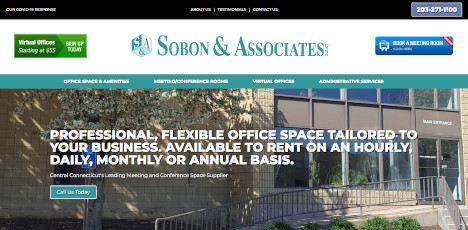Does your website not convert visitors into customers? If you're like most small businesses, you probably don't have the foggiest idea of what kind of impact your website has on your business. After all, who comes to a website's homepage to check whether it's worth visiting again? It might seem like a no-brainer: less traffic means more cost-effective business. But as almost any small business will tell you, the opposite is often true. When fewer people visit your site, that leaves you with a frustrated and unorganized list of offerings. Ugly side effects can include higher costs for features and services, as well as increased pressure to upsell and cross-sell. The good news is that routine maintenance is something that almost every small business needs to do on an annual basis. In fact, without it, your business risks going offline sooner rather than later. So even if you're not exactly sure how to start looking into website maintenance as a potential service provider for your business (or whether it even qualifies as work that needs doing), taking care of regular upkeep could be one of the best things you can do for its long-term health.

A Neglected Website Can Hurt Your Business
Many small business owners don't realize the critical impact their website has on their success. It's easy to assume that as long as your site is up and running, it's fine. But an outdated, buggy, or poorly-designed website can actually lose you business and revenue.
When website problems frustrate visitors, they leave without exploring your offerings or making a purchase. Fewer visitors means you miss out on potential sales and growth opportunities. An unattractive or confusing site also leads visitors to form negative perceptions about your business’s credibility and professionalism. The good news is that with regular maintenance and updates, you can keep your website generating results. Things like speed optimizations, security patches, layout improvements, broken link fixes, and content updates are essential. If you neglect these tasks, your site's performance and conversion rates will steadily deteriorate. Investing in professional website maintenance services is one of the smartest moves a small business can make. Not only will it help you avoid losing business, but it will maximize your website's capability to attract visitors and drive revenue. Paying attention to your website’s health is just as important as your other marketing initiatives in today’s online world. Treat your website maintenance with the same care as you would any other asset vital to your success.
What is Website Maintenance?
Website maintenance refers to the regular activities performed to keep a website functioning properly and up to date. It involves tasks such as monitoring the site for errors, updating software and plugins, backing up data, optimizing performance, and ensuring security. While it may seem like a tedious and time-consuming task, website maintenance is essential for the success of any business with an online presence.
A well-maintained website not only enhances user experience but also improves search engine rankings, boosts website traffic, and increases conversions. It helps to keep your site reliable, secure, and competitive in the ever-evolving digital landscape.
Website maintenance can be categorized into two main types: proactive and reactive. Proactive maintenance involves regularly scheduled tasks aimed at preventing issues before they occur, while reactive maintenance focuses on fixing problems that have already arisen.
Why Does Website Maintenance Matter?
Website maintenance is not just about fixing bugs and technical issues.
It plays a crucial role in ensuring the overall health and performance of your website. Here are some key reasons why website maintenance matters for your business:
1. Enhanced User Experience: A well-maintained website provides a seamless and enjoyable experience for visitors. Regular updates and improvements help to optimize site speed, navigation, and functionality, making it easier for users to find what they need and take desired actions. A positive user experience leads to higher engagement, increased time spent on the site, and improved chances of conversions.
2. Improved Search Engine Rankings: Search engines like Google favor websites that are regularly updated and properly maintained. By keeping your website up to date with fresh content, fixing broken links, and optimizing for relevant keywords, you can improve your search engine rankings and attract more organic traffic. Higher visibility in search results translates to increased brand exposure and potential customers.
3. Enhanced Security: Cybersecurity threats are a constant concern for businesses operating online. Regular website maintenance helps to identify and fix vulnerabilities, install security patches, and implement measures to protect against malware, hacking attempts, and data breaches. By prioritizing security, you can safeguard your website and sensitive customer information, earning trust and credibility.
4. Reduced Downtime: Website downtime can have severe consequences for your business, leading to lost revenue, damaged reputation, and frustrated customers. Routine maintenance ensures that your website is functioning properly, minimizing the risk of downtime due to technical issues or server failures. Regular backups also provide a safety net in case of data loss or website crashes.
5. Cost Savings: Investing in website maintenance can actually save you money in the long run. By addressing issues early on and preventing major problems, you can avoid costly emergency repairs and potential loss of business.
Regular maintenance also extends the lifespan of your website, reducing the need for frequent redesigns or complete overhauls.
What Can You Do to Ensure Your Site Stays Healthy?
Maintaining a healthy website requires ongoing effort and attention. Here are some essential tasks and best practices to ensure your site stays in top shape:
1. Regular Updates: Keep your website's content, software, and plugins up to date. This includes regularly publishing fresh and relevant content, installing the latest security patches and bug fixes, and upgrading to the latest versions of plugins and themes. Regular updates not only improve performance but also protect against vulnerabilities and compatibility issues.
2. Backup and Recovery: Regularly back up your website's data, including files, databases, and configurations. This ensures that you have a copy of your site in case of accidental deletion, hacking, or server failure.
Test the backups periodically to ensure they are working correctly and can be restored if needed.
3. Security Measures: Implement robust security measures to protect your website from threats. This includes using strong passwords, enabling two-factor authentication, installing security plugins, and regularly scanning for malware and vulnerabilities. Regularly monitor your website's security logs for any suspicious activity and take immediate action if any breaches are detected.
4. Website Performance Optimization: Optimize your website for speed and performance. This includes minimizing file sizes, enabling caching, optimizing images, and compressing scripts and stylesheets. Regularly monitor your website's performance using tools like Google Page Speed Insights and make necessary optimizations to improve loading times.
5. User Experience Enhancements: Continuously improve the user experience of your website. Conduct usability tests, gather feedback, and make necessary updates to improve navigation, readability, and accessibility. Regularly check for broken links, outdated information, and any other issues that may hinder the user experience.
6. Monitoring and Analytics: Regularly monitor your website's performance, traffic, and user behavior using analytics tools like Google Analytics. This will help you identify trends, track conversions, and make data-driven decisions to improve your website's effectiveness.

The Top 3 Things Small Businesses Need to Do Regularly to Stay Online and Why
1. Content Updates: Regularly updating your website's content is essential for attracting and engaging visitors. Fresh and relevant content not only keeps users coming back but also helps with search engine optimization. By regularly publishing blogs, news articles, and other valuable content, you can establish yourself as an industry expert and drive organic traffic to your site.
2. Security Audits: Conduct regular security audits to identify and address any vulnerabilities in your website's infrastructure. This includes checking for outdated software, weak passwords, and potential security loopholes.
By staying proactive and vigilant, you can protect your website and customer data from potential cyber threats.
3. Performance Monitoring: Continuously monitor your website's performance to ensure optimal user experience. This includes tracking page load times, server response times, and overall website responsiveness. By addressing any performance issues promptly, you can provide a seamless browsing experience for your visitors and prevent them from bouncing to your competitors.
Bottom Line
Website maintenance is not a one-time task but an ongoing commitment to the long-term success of your business. By investing time and resources into regular upkeep, you can ensure that your website remains healthy, secure, and competitive in the digital landscape. Whether you choose to handle maintenance in-house or outsource it to a professional service provider, prioritizing website maintenance is vital for maximizing the value and impact of your online presence.
Conclusion
In conclusion, website maintenance is a vital aspect of running a successful business in today's digital age.
It goes beyond just fixing bugs and technical issues it encompasses a range of tasks aimed at optimizing performance, enhancing user experience, improving security, and staying competitive. By regularly updating content, securing your website, monitoring performance, and implementing best practices, you can ensure that your website remains a valuable asset and continues to drive business growth. Don't neglect website maintenance – it's an investment that will pay off in the long run.







